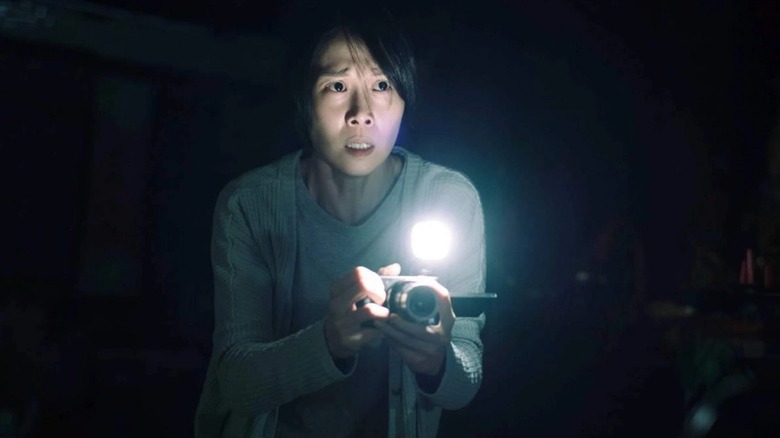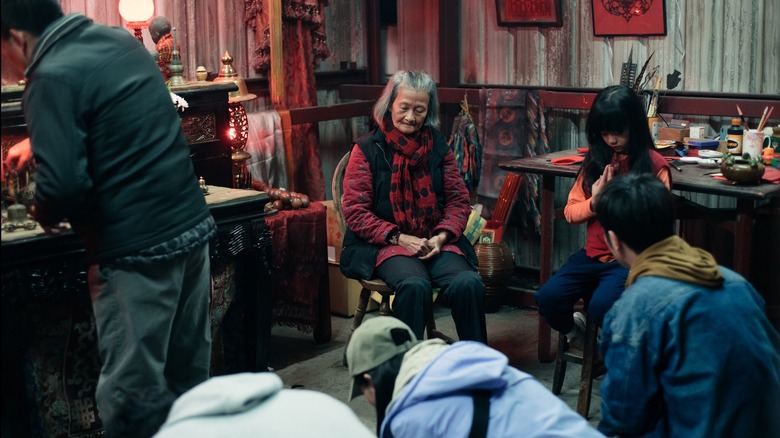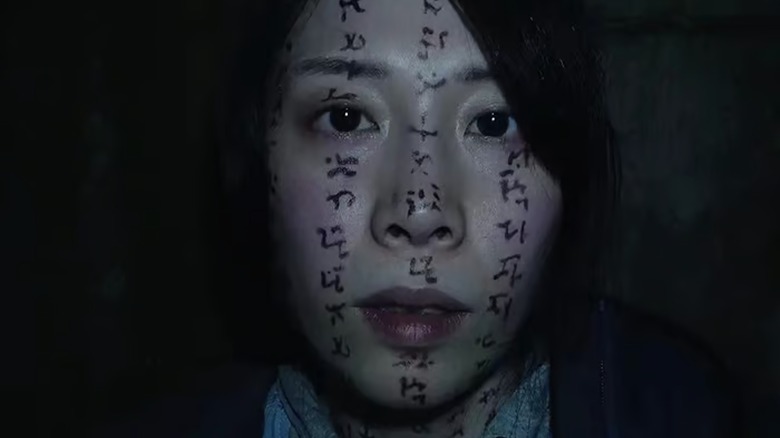The Taiwanese Thriller On Netflix That Ignites Fear Through Ancient Curses
The found footage horror genre is fairly saturated by now, as it has become increasingly difficult to capture the gritty and realistic aura of "discovered" footage convincingly. This format, although effective, comes with its own limitations and genre tropes that can get tiring pretty soon, if not reined in with compelling storytelling. So, what makes Taiwanese found footage horror, "Incantation," so special that it received international acclaim the moment it premiered on Netflix? The answer to this is pretty layered: for one, "Incantation" uses standard tropes only to subvert them eventually, and utilizes a clever narrative gimmick to heighten fear among audiences as a collective. Unbeknownst to the viewer, "Incantation" becomes an interactive experience, irrespective of whether one chooses to interact or not.
No, this is not a direct, straightforward interactive narrative of the "Bandersnatch" variety where the viewer gets to make key choices to help branch the storyline towards different outcomes. However, the fact that found footage in itself carries connotations of something that feels more real, much like a camcorder containing disturbing footage found in the woods, the film manages to hook into this latent fear and hammer its final twist home. To be fair, "Incantation" is fairly reliant on shock value and jumpscares, but, as the frequency of these sudden knee-jerk reactions is peppered evenly throughout, the ride feels truly hellish, leaving an uneasy feeling in the gut. The fact that the premise was inspired by real events does not help matters at all, and only adds to the discomfort of the viewing experience.
Let us dive deeper into the world of "Incantation" to try and figure out why it manages to evoke such strong reactions among diverse audiences.
Telling a morbid tale out of order
"Incantation" starts off with the found footage that's central to its premise, and dives straight into the bowels of terror. The tropes used here are not unconventional by any means: individuals meddle into affairs that they should've steered clear of and unwittingly embroil themselves in a ritualistic religion they know nothing about, and the consequences are, unsurprisingly, ugly. There's a creepy tunnel that should not be entered at any cost (it is forbidden), but our trio, Li Ronan (Tsai Hsuan-yen), Dom (Sean Lin), and Yuan (Wen Ching-yu), ignore all warnings and enter anyway, and only Li Ronan survives the ordeal. What happened inside the tunnel is a mystery, as this part of the footage is now damaged, and it's up to Li Ronan to piece together this unsettling mystery that claimed the lives of her loved ones.
The film's greatest asset when it comes to ramping up the fear-laced suspense is its out-of-order storytelling that deliberately feels disjointed and jarring. We learn that Li Ronan was pregnant during the time she ventured into the remote clan village with her friends, and was asked to submit her name, along with that of her unborn daughter, for the sake of a Yunnan ritual. After the child, Dodo, is born, Li Ronan's mental stability deteriorates, which is conveyed via jumps in time and a slew of hauntings that feel visceral, all of which are presented as recorded footage. There are gaps in the narrative that are filled when one least expects it, and when everything suddenly clicks into place, it is too late to back out of the experience.
This disorienting ordering, coupled with gory jumpscares and sudden violence, works together to weave a film that uses the premise of ancient curses to keep audiences hooked.
You're a part of Incantation too
The twist ending in "Incantation" works because Li Ronan is the one directly communicating with the viewer since the first frame, urging us to help her save Dodo with the power of prayer. The sigil and incantation of the Mother-Buddha are branded onto the screen at intervals, a constant reminder that we are a part of the ritual that Li Ronan wants to carry out. This is, obviously, done in a way to trick us to subvert expectations, where the film uses optical illusions and visual afterimages to induce certain emotions throughout the narrative.
While we're repeatedly reminded that these twin ritual elements help dilute the curse on Dodo in some capacity, the how and why are deliberately withheld from us. This is done in a way to appeal to our sense of empathy which amplifies during sequences where Dodo is possessed or in extreme pain. As it is uncomfortable to witness a child suffering so violently on screen, this instinct works against the viewer, and well with the twist execution towards the end.
Another narrative device used to heighten fear is the footage itself, which is later repaired and causes characters to get possessed and harm themselves. Moreover, every person who comes into contact with Li Ronan suffers, and this latent connection is extended to the viewers as well, who have seen the footage along with the characters. While this induces a mildly-lingering effect of the "Ringu" variety and doesn't quite work once the credits roll, it is an interesting effort to suspend disbelief and indulge us in the thrill of being included in a scenario that is so innately traumatizing and terrifying. Sounds like a solid found-footage horror experience, right?
"Incantation" is currently streaming on Netflix.


